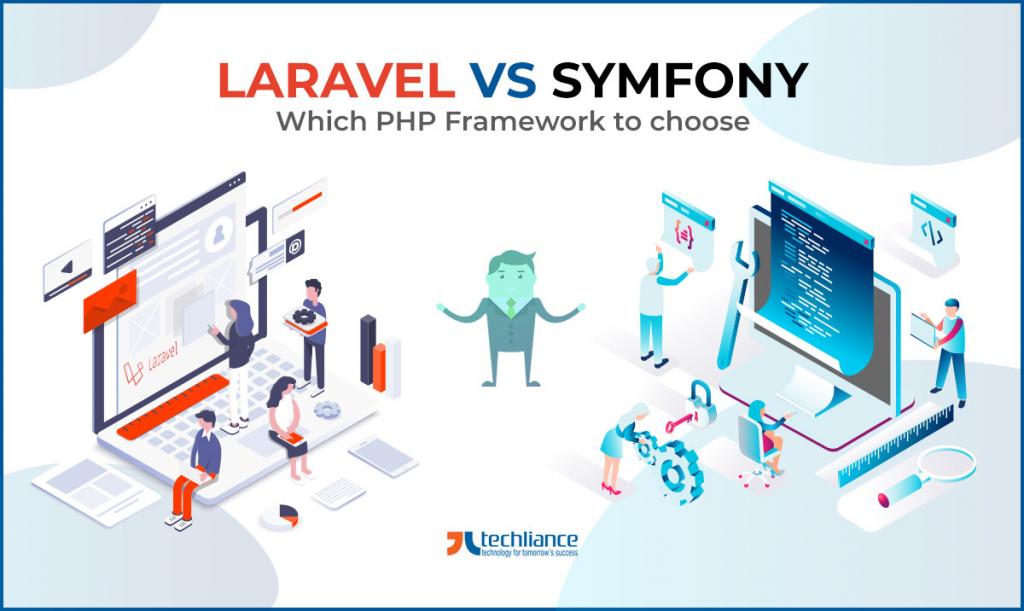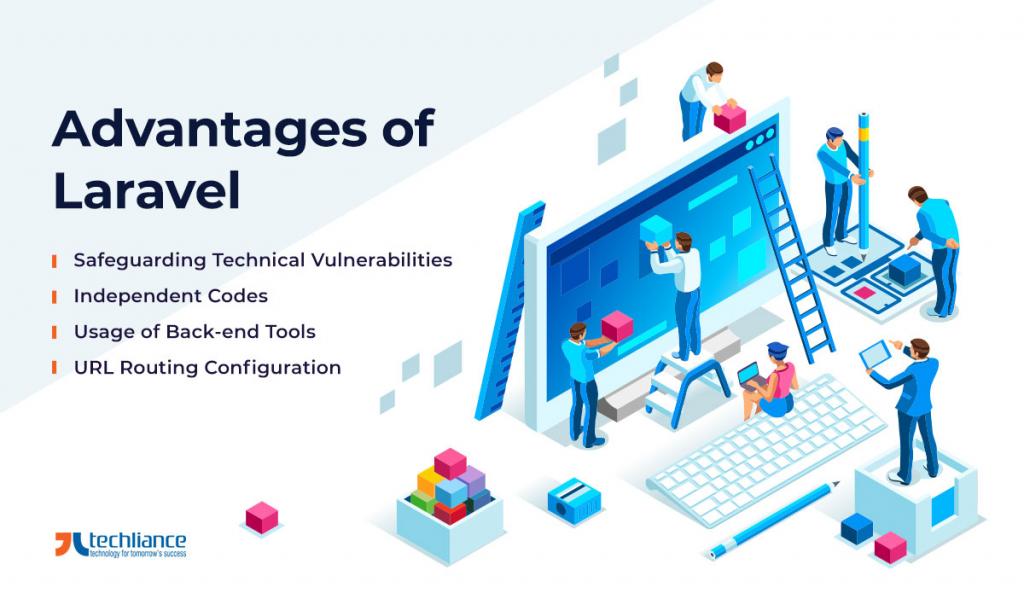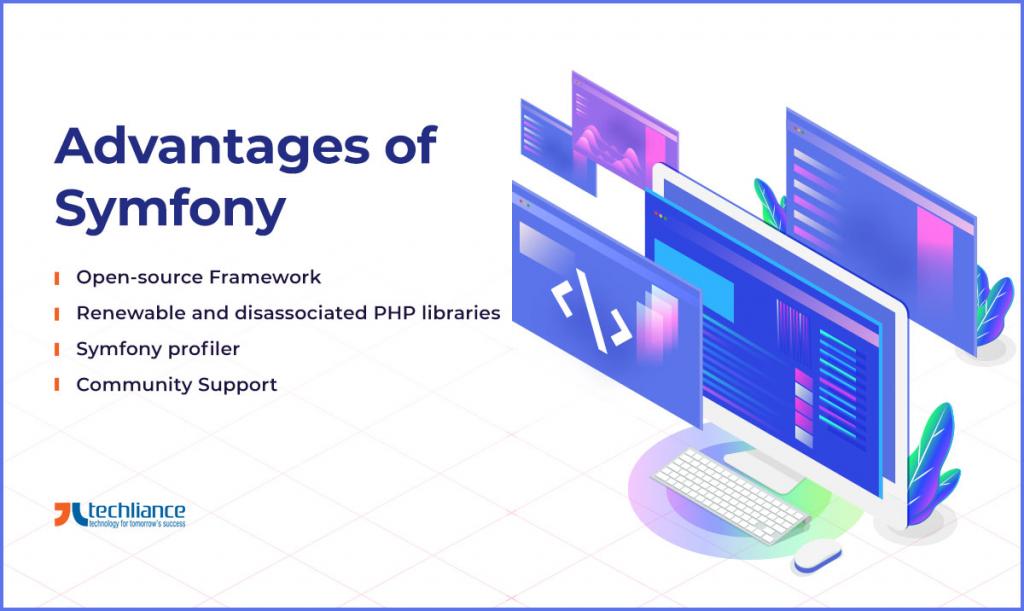PHP is one of the most used open-source scripting languages in the world. It has several web frameworks, which have wide-scale usage and varying learning curves. Through 2023, an evaluation like Laravel vs Symfony is almost necessary when starting a website project in PHP.
Websites have essentially become the front door to business operations in current times. PHP as a general-purpose computer language is highly suitable for web programming. Accordingly, it is ideal for creating websites that are valuable for users, and play a great role in business growth.
Having a user-friendly website means a competitive edge over competitors in today’s cut-throat struggle for market domination. Two well-known PHP frameworks, Laravel and Symfony are widely popular in the present web-based software development industry. Globally and in the USA, Laravel has a great demand among business leaders.

Laravel vs Symfony – Similarities
Symfony and Laravel frameworks have their fair share of similarities. Because they use the same programming language, i.e. PHP. They use a multi-computing platform which makes them cross-platforms in nature.
Laravel and Symfony produce multi-language content and provide a multi-use facility. There are also some areas where the two PHP frameworks have parallel attributes. For example, a pattern for interfaces, scaffolding of the application, support text research, etc.
Implementation of quality website development practices is a recipe for success. Laravel and Symfony together appear in our article about the best PHP web frameworks as well. Adoption of any of these two web application frameworks leads to a perfect website.
Advantages of Laravel
The following are some of the prominent features of Laravel in 2023.
- Safeguarding technical vulnerabilities
- Independent codes
- Usage of back-end tools
- URL routing configuration

Let’s explore these rewards of using Laravel in detail.
Safeguarding technical vulnerabilities
The primary quality of the Laravel framework is it has a secure system, that protects against many technical weaknesses. The security features of Laravel include cross-site scripting, SQL injection, cross-site request forgery, etc. Moreover, Laravel finds errors in a flash and fixes bugs faster.
Independent codes
Laravel provides a separation of “business logic code” from the “presentation code”. This helps in making web pages whose appearance you can change easily. Likewise, this feature enables businesses to craft more secure web applications for users.
Usage of back-end tools
Laravel uses back-end tools like Memcached and Redis etc. This makes the website development procedure much smoother. The code testing unit existing in Laravel also has a suitable way to evaluate web applications.
URL routing configuration
Laravel has a URL routing configuration where users make use of web applications by typing links. Users want to see product/service landing pages and helpful content pages. For instance, a blog, contact information, registration form, product description, etc.
In case, the web developer fails to properly incorporate URL routing. Then the web application will never understand the users’ desired web pages. This might lead them to a blank page with an error.
Advantages of Symfony
Given below are the strengths of Symfony during 2023.
- Open-source framework
- Renewable and disassociated PHP libraries
- Symfony profiler
- Community support

We now discuss these plus points of Symfony in depth.
Open-source framework
As an open-source PHP framework, Symfony is suitable for developing scalable web applications. Symfony operates on MVC (Model-View-Controller) architecture. This resourceful MVC pattern aids you to verify your website project work within a structured system.
This speeds up the development process and makes it simpler. It is done by splitting business and presentation layers from one another. The open-source nature of Symfony reduces project costs as well.
Renewable and disassociated PHP libraries
Both of these are modules in the Symfony framework, which works as a foundation for web development projects. Using these will help you to complete common tasks easily. Rather than writing lengthy source codes.
Symfony profiler
Developers can use a feature known as the “Symfony profiler” to track the behavior of applications. It is done by mapping all its whereabouts and actions on a back-end side. This is quite a handy feature for performant web apps.
Community support
Symfony aces in most aspects of website programming. Whether it is speedy development or automated deployment of the application. Symfony is full of benefits that you look for in a PHP framework.
In addition, Symfony also has the backing of the large developer community. This is proof of the embrace and active use of Symfony by software companies and web programmers alike. Subsequently, developers can make good use of this community support for resolving problems as well.
Laravel vs Symfony – Comparing the Performance and Stability
Behind every successful web application, the performance and scalability of the said system work like a backbone. In the case of Laravel, it has a bunch of unified APIs for caching views. On the other hand, Symfony caches views and source code.
This affects the loading time of websites built in Symfony. Websites programmed in Laravel have an average loading speed of about 60 milliseconds. In contrast, websites coded using Symfony, have a loading time of about 250 milliseconds.
Another significant edge of Laravel is that it lets you do PHP programming with lesser code and greater execution. This is the reason why many social media platforms and business websites are made using the Laravel framework. Since, using Laravel offers you benefits like faster delivery, swift online appearance, and early-to-market presence.
On the other side, Symfony takes more effort when it comes to coding. It involves more time and financial resources during the initial stages. Correspondingly, you have to exert a lot of effort while configuring its elements.
At the same time, Symphony can prove a great selection in some cases. Particularly, when it comes to complex web projects. So, many complex business owners reach out to Symfony development services agencies to develop their websites.
Laravel vs Symfony – Outcome of the debate
After the Laravel versus Symfony showdown, we know that both Laravel and Symfony have many satisfactory features. Both of these PHP frameworks are used in a vast radius of website projects. That too in many industries worldwide and in the United States.
Laravel is a web developer’s choice who wants to develop a business website with rapid development, performance, and speed. Symfony is made for complex websites and large web applications. Thus, many popular websites are made using both of these PHP frameworks.
Laravel and Symfony frameworks have abundant features for developers, businesses, and their users. The bottom line is that developers should not make their decision as per their individual preferences. So, they must choose a PHP framework after proper consideration of their business requirements, abilities, and performance goals.

To sum up
A strong web presence has become more important in the 2020’s decade. Consequently, a website has become a necessity for every business internationally and in the US. At present, web-centric software development is experiencing a boom in all industry verticals.
Thanks to the diverse requirements of the target audience for uniqueness. This need has risen as the majority of businesses are hit by Coronavirus. More so, after the economic slowdown and lockdowns in big cities due to COVID-19.
Do you require an attractive, user-friendly, and perfect website? Whether it is Laravel or Symfony, qualified web developers at Techliance are available for help. Have a brainstorming discussion and set off with a 7-day trial now.




